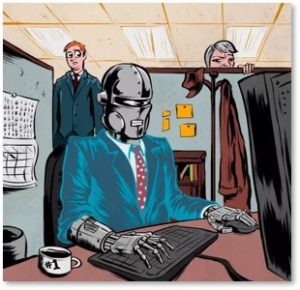 In her New Yorker article, “Are Robots Coming for Your Job,” author Jill Lepore takes on the subject of work-force automation with tongue firmly planted in cheek.
In her New Yorker article, “Are Robots Coming for Your Job,” author Jill Lepore takes on the subject of work-force automation with tongue firmly planted in cheek.
To bolster her case, she quotes Martin Ford, who wrote the 2015 book, “Rise of the Robots: Technology and the Threat of a Jobless Future and lectured on “Confronting Dystopia: The New Technological Revolution and the Future of Word,” Oddly enough, the two quotes contradict one another. Neither Ms. Lepore nor Mr. Ford seem to recognize this.
Conflicting Quotes on Automation
In the first quote, Ms. Lepore opines:
“…history shows that the economy has consistently adjusted to advancing technology by creating new employment opportunities and that these new jobs often require more skills and pay higher wages.”
Okay, sounds good. Let the machines do the dirty work while we move onward and upward to more interesting jobs with better paychecks. Who has an application to Starfleet Academy?
Then we get to the second quote, this one from Ms. Lepore:
‘In the twentieth century, automation of industrial production led to warnings about ‘unprecedented economic and social disorder.’ Instead, displaced factory workers moved into service jobs. Machines eliminate jobs; rising productivity creates new jobs.
 Umm, Okay. But here’s the rub. Service jobs may require new skills, not more skills, but they very rarely pay higher wages. The hairdressers, yoga instructors, real estate agents, nail technicians, and personal fitness trainers will attest that they don’t bring home the big bucks.
Umm, Okay. But here’s the rub. Service jobs may require new skills, not more skills, but they very rarely pay higher wages. The hairdressers, yoga instructors, real estate agents, nail technicians, and personal fitness trainers will attest that they don’t bring home the big bucks.
You also won’t find accountants, insurance agents, consultants, and legal aids rushing out to get their real estate licenses or cosmetology degrees. They would be taking a big step down—and they know it. Sure, you used to be a software developer and now you work at Walmart. Congratulations!
So, who’s kidding whom?
Resisting Scientific Change
We will always have people who react to change by clinging to the past and refusing to consider who things might be different. We saw this on Season 3 of the PBS show Victoria.
Price Albert, a man of vision and an interest in scientific progress, finds himself confronted over and over by men who cling to Accepted Wisdom.
In his election to the Chancellorship of Cambridge University, he is opposed by the Earl of Powis, who was called “the best bulwark” of the Anglican Church and his followers. That cadre strongly resisted the pressure to reform. Prince Albert’s vision of the Great Exhibition of 1851, again in the face great public criticism.
In the same Victorian period, Dr. John Snow correctly identified water contaminated by sewage as the cause of cholera but was dismissed and ridiculed by conservative doctors who clung to the Medieval theory of miasmas.
Anticipating Consequences of Automation
“Aha!” you say, “That’s just what you’re doing—resisting change.” Well, no. I have already written about some positive effects of technological advances, whether through AIs, kiosks, or automation. My post on When Automation Drives Progress gives three  concrete examples.
concrete examples.
Instead, I see that change is happening and explore the consequences. Is it not better to anticipate a problem and fix it before it causes major disruption? Today I say that service jobs do not solve the problem of robots and artificial intelligence replacing educated white-collar workers.
A workforce of newly under-employed, disgruntled, and poorly paid workers will not share in the benefits of automation. Unless, of course, they are lucky enough to get taken into the shelters built by the super-wealthy to protect themselves from the masses with torches and pitchforks.
A Warning of Future Problems
What I am doing is something different. In the past few years, I have noted a new technological development — automation through AI, robots, and kiosks — and warned that it contains the power to disrupt the American economy. While it may be tempting to believe that everything will work out all right in the end, the smarter course is to anticipate potential problems and plan to prevent them.
Service jobs do not solve the looming problem of mass white-collar unemployment. We have to do better.
10 Related Posts:
- Robots, Automation and Jobs: A Status Report
- Employment’s Down but Workers Aren’t Doing Better
- The Robots are Coming to the Workplace: What You Need to Know
- News on Robots, Jobs and Employment
- Employment News: Good, Bad and Ugly
- When Automation Drives Progress
- Real-World Numbers on Robots and Unemployment
- Robots, Kiosks and Appliances
- Optimism, Pessimism and Robots
- Will Artificial Intelligence Destroy the Middle Class?

